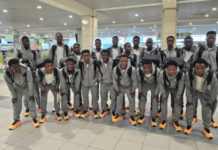Personnel of the Ghana Immigration Service (GIS) at the Aflao border have intercepted 150 young Ghanaian women who were being trafficked to the Gulf countries through neighbouring Togo to work as housekeepers.
The victims aged between 18 and 28 were mostly students who had been lured by the traffickers and promised a better future in the Gulf countries. Some of the traffickers had also been arrested and are to be arraigned.
The Comptroller General of the GIS, Mr Kwame Asuah Takyi, made this known in Accra yesterday when the Commissioner of the Customs Division of the Ghana Revenue Authority (GRA), Mr Isaac Crentsil, paid a visit to the headquarters of the GIS.
He also announced that plans were also far advanced to restrict the issuance of visas to certain nationals at the country’s entry points.
The two heads were expected to discuss issues bordering on the next phase of the Integrated Border Management Project between the two agencies, the strategy to address cross-border crimes in view of the directives by the government to close down internal barriers and any other issues relating to the two agencies.
Mr Takyi said following the ban placed on travels to the Gulf countries by the government, the perpetrators did not travel through the Kotoka International Airport (KIA) again but had resorted to the use of the Aflao and other border posts to traffic the young women to neighbouring countries.
Neighbouring countries
He said the traffickers were bent on defying the directive by the government and were now focusing their attention on neighbouring countries and warned that the security agencies were ready to fight the menace and would ensure that no Ghanaian girl was sold into slavery anywhere.
He said with the removal of the checkpoints it would be prudent for the two institutions to join hands and ensure that the security of the country was protected.
Mr Takyi indicated that there was a coordinated effort to curb the menace and called on the media to educate the public, especially the young girls, on the difficulties those already there were facing.
For his part, the Commissioner of the Customs Division said the removal of the internal barriers would be done on a pilot basis and by July 31, 2017, all internal checkpoints in the Northern Region would be removed followed by those in the south in August.
Checkpoints
He said the removal of the checkpoints did not mean that traders would be left on their own but the Customs Division in collaboration with Immigration and other security agencies, would intensify patrols.
He said the removal of barriers formed part of internal Customs organisation and the Vice-President’s directive to rid the country of checkpoints to ensure the free flow of goods and services.
He said on the central corridor from Tema to Paga and on the Lagos-Abidjan corridor, there were ECOWAS-mandated checkpoints which must be maintained.







